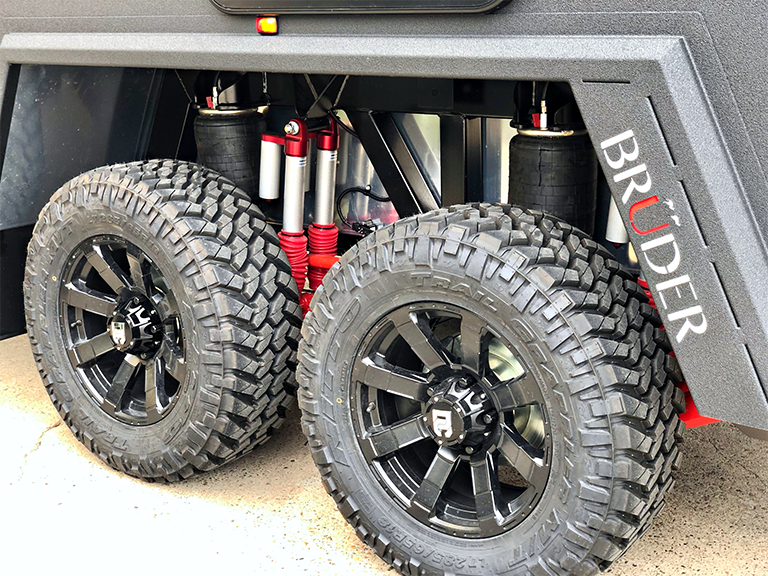What makes an off-road caravan?
When it comes to caravanning, you’re likely to make many choices. Some are easy like choosing tomato over BBQ sauce for your evening camp-side fry-up. Some are much more complex.
That’s the case when it comes to following that romantic notion of leaving the open road to go off-road and explore the lesser known, but no less enjoyable, adventures found in out-of-the-way places. The trouble is knowing if your van or the van you might buy, is truly up to the rough and tumble of a genuine off-road trip.
Here’s some advice from RV& Caravan Centre’s Matt Linton. Matt’s experience makes him the goto person when it comes to questions to do with manufacturing and repairing caravans. Matt explains some of the key things to look for in a true off-road caravan. After all, that’s fundamental to enjoying years of exploring “off the map.”
Asking the right questions
These days the off-road tag could apply to a caravan suited to rolling down a reasonably smooth, dusty country laneway to a rig able to tackle some solid bush bashing.
Asking the manufacturer to clearly outline the sort of travel their van is made for could save you from experiencing a negative impact on your warranty or insurance if you push the van beyond the manufacturer’s intended use.
With that in mind, Matt says a true off-road van is not likely to be a budget offering. Here’s why.Features of an off-road caravan
The sole purpose of an off-road caravan is to withstand the worst routes, irregular roads and the harshest of conditions that you can encounter in Australia.
Before buying a new van or checking to see if your existing van makes the off-road grade consider at least these few tips from Matt.
Suspension

While independent trailing arm suspension is common, suspension-wise Matt says air-bag suspension like the Cruisemaster ATX airbag kit by Vehicle Components tops if your budget can accommodate the expense. “If you want the ultimate off-road RV then put on air-bags.”
Vehicle Components also make quality coil suspension that don’t lean on the budget quite as much, but still paired up with electric drum or hydraulic disc brakes makes for a nice, safe and sturdy off-road combo capable of handling up to 4.5 tonnes ATM.
Hitch
Again, Matt fancies the popular Vehicle Components DO35 V3 hitch. He said that’s because it articulates very well, has the strength and is an easy hook-up.” It’s a hitch that will take an Outback beating.
Chassis
While there is no doubt that the quality of the chassis is key to van longevity, Matt doesn’t necessarily go along with the idea that there is no other off-road chassis recipe than the usual A-frame of 150mm x 150mm RHS members with chassis rails 150mm x 50mm or 100mm x 50mm members.
Matt says the chassis construction design depends on the size of the caravan. He says the usual approach of “if it breaks make it bigger,” isn’t necessarily the correct answer. The trouble with the bigger is better approach is that it leads to a tendency to transfer the impact of off-road travel back up to the structure mounted on the chassis. He says, there are many excellent chassis designs that flex and absorb the impacts.
For him, Bruder Caravans produce chassis that are prime examples of the clever use of chassis technology. This tech includes dual compression isolation mounts that reduces the transfer of off-road vibrations and to the caravan body.
“If we are talking the ultimate off-road caravan, you want a chassis that is designed to distribute the stresses across the frame of the chassis.”
Beyond that, Matt says potential buyers of off-road caravans should look to see that the chassis has ample support members to secure the flooring and allow no movement of the flooring.Payload
Although tow capacity is important for all caravans, it is an essential consideration for off-road caravans. That’s because the total weight of the caravan and payload of the tow vehicle should not exceed the towing capacity of your tow vehicle. He says remember a caravan’s TARE weight is with a completely empty van, and that means that a really heavy off-road van plus the payload it carries may well be a bit cruel on your tow vehicle when faced with hauling the rig through the rough stuff.
Water Storage
More than a few days in the bush means having a good supply of water. The trouble is, water means weight. So, Matt’s advice is to carry enough water, well placed within the chassis frame and between the wheels, but only enough for a couple of days. To stay longer, make sure your van has a water pump and filter system or water purifying system so that you can draw water from a stream, creek or river and refill your water tanks.
Solar Power
Matt says you should work out how much solar power you will need to consume in 24 hours and then make sure you have enough solar to recharge your batteries within six hours. He says this might mean carrying portable solar panels.
Cladding
Off-road caravan cladding needs a good combo of low-weight and high strength. With that in mind, Matt argues that off-road rigs really should not be clad in traditional aluminium. Aluminium composites might do the job but, Matt favours the new high-tech options like closed cell epoxy bonded composite that offer an all-in-one light yet strong, fully insulated option that can readily be repaired if necessary. Matt points to the style of cladding used by manufacturers like Zone RV, offer strength and weight advantages.
Going off-road